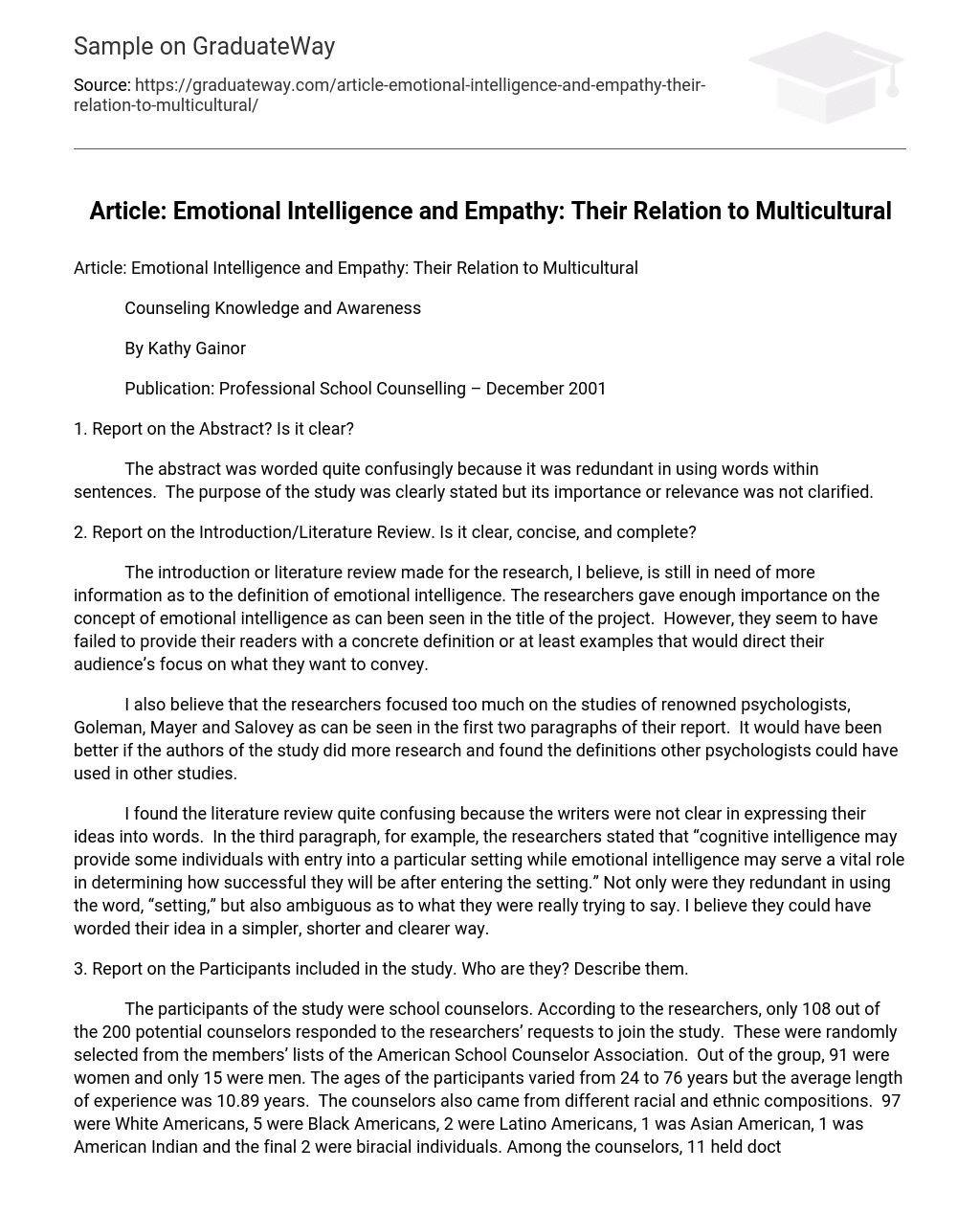Counseling Knowledge and Awareness
By Kathy Gainor
Publication: Professional School Counselling – December 2001
1. Report on the Abstract? Is it clear?
The abstract was worded quite confusingly because it was redundant in using words within sentences. The purpose of the study was clearly stated but its importance or relevance was not clarified.
2. Report on the Introduction/Literature Review. Is it clear, concise, and complete?
The introduction or literature review made for the research, I believe, is still in need of more information as to the definition of emotional intelligence. The researchers gave enough importance on the concept of emotional intelligence as can been seen in the title of the project. However, they seem to have failed to provide their readers with a concrete definition or at least examples that would direct their audience’s focus on what they want to convey.
I also believe that the researchers focused too much on the studies of renowned psychologists, Goleman, Mayer and Salovey as can be seen in the first two paragraphs of their report. It would have been better if the authors of the study did more research and found the definitions other psychologists could have used in other studies.
I found the literature review quite confusing because the writers were not clear in expressing their ideas into words. In the third paragraph, for example, the researchers stated that “cognitive intelligence may provide some individuals with entry into a particular setting while emotional intelligence may serve a vital role in determining how successful they will be after entering the setting.” Not only were they redundant in using the word, “setting,” but also ambiguous as to what they were really trying to say. I believe they could have worded their idea in a simpler, shorter and clearer way.
3. Report on the Participants included in the study. Who are they? Describe them.
The participants of the study were school counselors. According to the researchers, only 108 out of the 200 potential counselors responded to the researchers’ requests to join the study. These were randomly selected from the members’ lists of the American School Counselor Association. Out of the group, 91 were women and only 15 were men. The ages of the participants varied from 24 to 76 years but the average length of experience was 10.89 years. The counselors also came from different racial and ethnic compositions. 97 were White Americans, 5 were Black Americans, 2 were Latino Americans, 1 was Asian American, 1 was American Indian and the final 2 were biracial individuals. Among the counselors, 11 held doctoral degrees, 90 finished their master’s degrees while only 4 finished their bachelor degrees. 68.5 percent of the sample also said that they had taken at least one academic course related to multicultural counseling.
4. Identify the purpose of the study.
The researchers wanted to know if previous multicultural education, emotional intelligence, and empathy would account for significant variance in school counselors’ self-perceived multicultural counseling knowledge and awareness.
5. Provide a general overview of the article. Who is its target audience?
The researchers sent questionnaires by mail to their random sample. What they sent contained questions based on the Emotional Intelligence Scale (EIS) – a self-report measure of emotional intelligence based on a previous theoretical model of emotional intelligence developed by Salovey and Mayers in 1990; the Interpersonal Reactivity Index (IRI), a 28-item, five-point Likert-type of scale that assesses different dimensions of empathy and; the Multicultural Counseling Knowledge and Awareness Scale (MCKAS), a 32-item scale that measured dimensions of self-perceived multicultural counseling competence.
The results showed that previous multicultural education, emotional intelligence and empathy accounted for significant variance in perceived multicultural counseling knowledge and awareness. However, it was shown in the results that the participants also believed that too much empathy or involvement in their clients’ problems can negatively affect their own perception of competence.
The target audience would be multicultural counselors, psychologists and other members of the academic field who needed information as to how counselors would be given support with regards to their self-perceived competence.
6. Provide a general response to the article.
I believe that the research done was important so that schools can improve their counseling programs. However, the report was poorly written, lacked examples, relied too much on citations from different sources with almost the same authors and lacked definitions for many important terms like emotional intelligence. I also believe that the ages and length of experience should have been taken into consideration as variables in the research.





